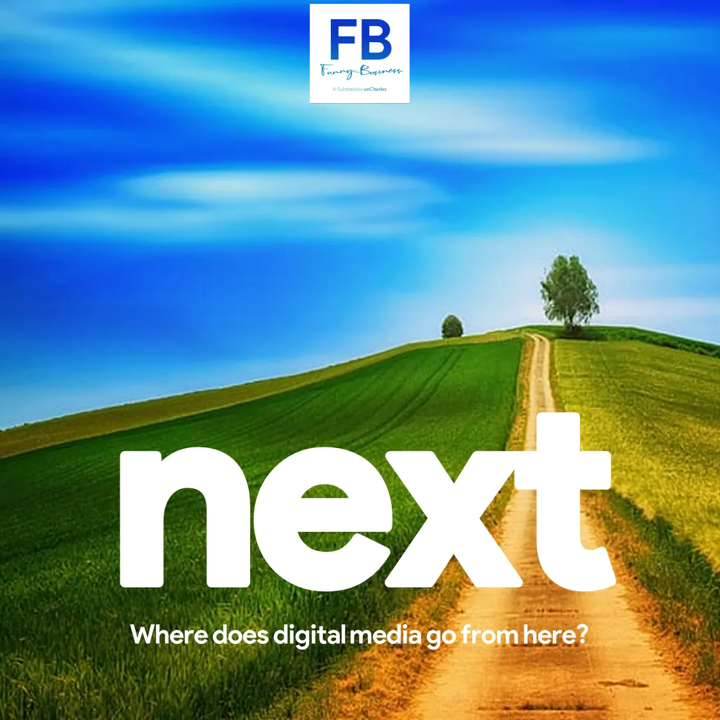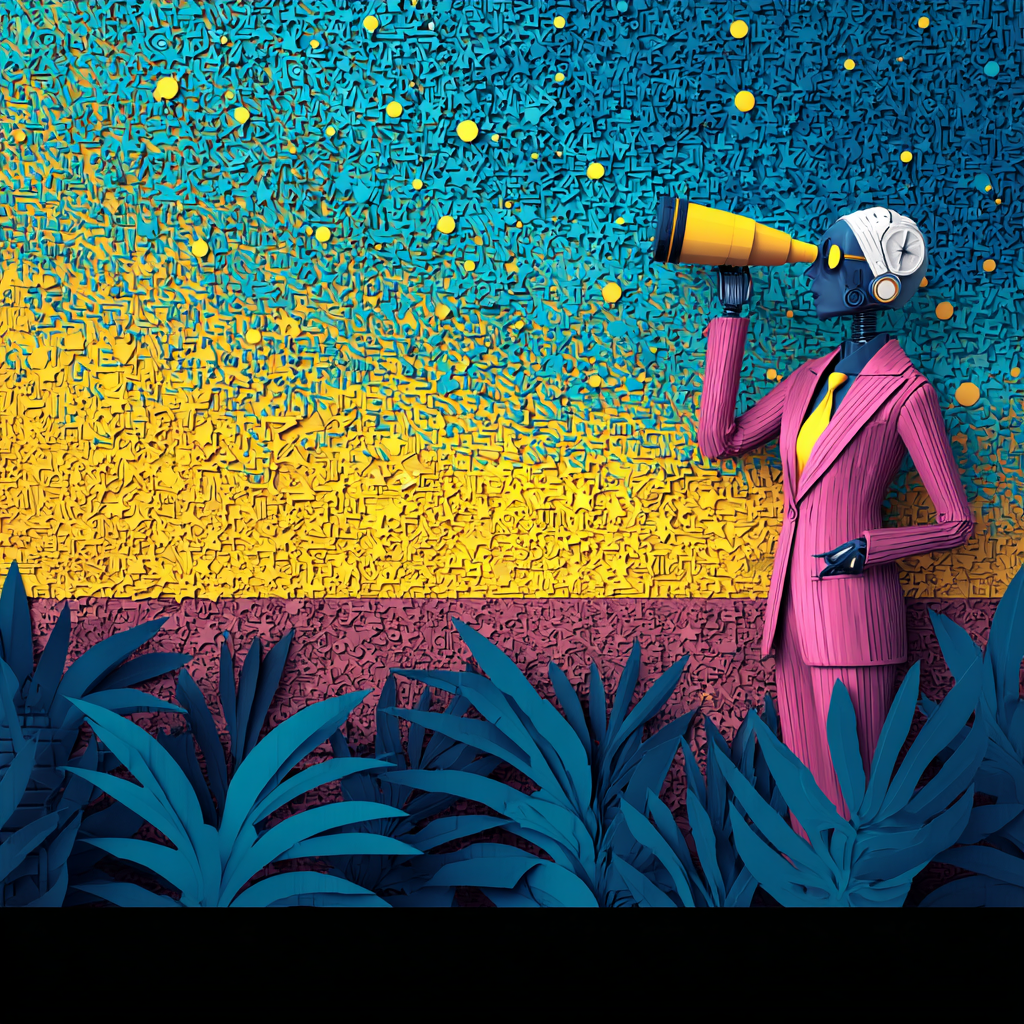The continuing saga of digital media and ads
Three ad guys walk into a podcast pre-call. The answer to that enigmatic half joke in a moment. But, first, a word from our sponsor. Lee Elliott and Matt Walsh invited me to chat with them on their podcast, Bad Impressions. I expect it will drop after you read this. So, === SPOILERS === we talked about why digital media and the internet are in an ashes to ashes phase.
+ + +
No, this isn’t a transcript of the podcast. Because we haven’t done it yet. But, I do want to make a good impression on the guys for hosting me. So, I’m writing this to organize my thoughts and find pithy ways to say pithy things without sounding pissy.
Guys, “Charles, what up with media, marketing, and advertising?” Honestly, I have no idea if that’s how they phrased the pre-call opening Q. I was on camera and couldn’t stop staring at the 20-somethingth day of my bad hair month. It was simultaneously baldness, a cowlick, and some sort of Alfalfa thing from the Little Rascals.
Me, “We’re twenty-five years into what people think of as the digital media era — give or take a few — and it’s circling the bottom of the barrel.” Lee, “You mean drain, right? Circling the drain…” His stern tone ensured his words hit with the 1960’s era Batman graphic Whap! of a nun cracking your knuckles with a wooden ruler. Yes, folks, this… this… is why people don’t pay me to appear on podcasts or show up when I’m announced to give the keynote about AI and journalism.
I’m not about getting words right. That’s for real writers and the far too few copyeditors left who help websites get smiley face stickers from the aforementioned nunnery. I’m all about ideas. Make the grand statement. Mess it up so badly that the words somehow stick. So my linguistic lapses seem almost purposeful. Some might say, “Sagaciously pedantic.”
I continued, “We agree on circle. Let’s start there.”
Digital media has come full circle. I got my first email address in 1986 and the Internet was, mostly, a collection of moderated message boards populated by the few geeks that had email addresses and knew the secret password, ‘rn.’ Short for read news. Which is ironic since there was no news there. Not in the then traditional sense anyway.”
After a while it all got too large. The hierarchical structure of message boards wasn’t the best way to consume vast media. So, my pal and roommate, Michael, created the search engine, and, then, connected mobile phones to the internet, and, then, whatever his other 236 patents did. But I’m getting off topic.
Search flattened the Internet (in pro-journalist terms, search made the internet democratic) and it made media al-gor-ithmic. Which makes sense since Al Gore created the Internet. Google tied automated curation of all information to ads which created the world’s first perpetual motion machine. We’d create content. Google would ingest it. We would search for it. Google would show us an ad. It was the mountain we all had to claim. Because… Google put it there.
Now, Google has ceded the Internet to Reddit. Their unpaid moderators curate our digital world.
Reddit is nothing more than a not-even fancified version of rn. Seventy million people use Reddit daily. Using the rule of thumb that fewer than 1% of social media users create most of the content, means that quips from 70,000 pimply faced folks living in their parent’s basements or taking breaks from hackathons to contribute comments to the Reddit KISS forum are the funnel through which our internet is delivered.
The ironies don’t stop there. Our vast internet has narrowed. A few people decide what we see. Reddit, which has no idea how to sell ads or make money, is top of the fold at the place where many start their Internet day. News is an afterthought. Give that a moment to let that sink in.
That’s why I plan to use this line, “Reddit has lived up to its tagline. They have become the front page of the Internet. The first answer to 99.6% of questions we ask Google come from Reddit’s message boards.”
Sidenote. I find adding “.6” to a number makes it more believable about 22.6% of the time. In my way, it’s an homage to the folks at BMW who added “and 2” to their 2000 car. Everyone had a round-numbered name for their car. The “And 2,” gave BMW’s 2002 panache.
Here we are. The media of the Internet has regressed to where it started.
Which brings us to ads. The first digital ads were seen on Wired.com. Six ads were hard-coded to be seen in a simple rotation when people arrived. The novelty of the medium and, by extension, the novelty to click on ads got people to click on them about half the time. Half. Fifty percent click-throughs. An advertiser would kill for one-tenth of that these days. Hell, a fiftieth would probably get some award at Cannes.
You can’t return to novel. So, instead systems leech what they can about our interests. And put relevant ads in front of us hoping to squeeze a little more juice out of that ad spend. Well, except they never seem to know when we already bought something.
See if this sounds familiar. You’re taking your family to — oh, I don’t know — the Greek islands for a couple of weeks this summer when you realize you don’t want to check luggage because the airline will lose it. So, you search for overhead-friendly bags. Then, everywhere you go, you see ads for crushable, lightweight, guaranteed to squeeze into those stupid metal frames at the gate luggage. Every website, all the ads that stream on Tubi, every digital billboard that seems to know you’re driving by like the sign did in Steve Martin’s 1980 classic, LA Story show you luggage ads. And, all of them track back to you because… cookies, cookies, and patent-pending tech in Ford cars.
Exhausted by the relentlessness of it all and with your trip around the corner, you relent. You go to Google, type luggage, see some media curated by Reddit, and buy the damn bags. Google takes all the credit. Because, hey, GA4 attribution.
But, you keep seeing the damn ads. Because no one told the machinery of ads that you bought this thing. It’s like an If statement without and End. Someone needs to add a Goto to get us to a new point in the code. Sorry if the object of that was insufficiently oriented. I left programming before C++ was a thing.
The ad machine built for this era is flawed in so many ways. To some extent that’s because it‘a built to operate on the democratic web. Open web is so passé. And, we’re not there any more.
We’re starting to see digital advertising return to its roots. The big platforms and publishers sell their ads directly. Just like in days of yore. Weeding out the tech stack of middle people who toss around acronyms like SSP and DSP. There is no open web. Small sites won’t be seen unless they mollycoddle Reddit’s basement-dwelling comment writers with benzoyl peroxide.
The more interesting question is: Where do we go from here?
When Google, and, then, social showed up, they had to prove their worth to advertisers. They sold ads at a discount versus incumbent media. Early DTC companies saw this market pricing anomaly. They gobbled up ads that propelled them and their quirky named products to the forefront of our minds. Allbirds. Peloton. Warby Parker. Harry’s. Bonobos. Subsidized cheap digital ads that sold shoes, sole-cycles, specs, shavers, and shirts worked so well there was no reason to subsidize the ads anymore. As ad prices progressed to market levels, existing DTC brands regressed to the mean.
Now search and social are the incumbents. AI looks like the new kid on the block. They’re playing from the same book as search and social. First, ingest everything before anyone knows what’s going on. Then, when asked about it, equivocate. “YouTube? No, I’m not sure if our text to video LLM learned on… what did you call it… YouTube? No.”
Search won for the same reason that AOL ultimately lost. The grass is greener. People will only stay in a walled garden for so long. Google bots could find relevant content in vast fields that no team (even a large one) could find for a massively multi-user Internet. Social approached it by deputizing the world’s largest unpaid army in history.
As search forgoes thoughtful curation and losses sight of what their user’s value; and, as social losses posters faster than AI can make up content for us to pretend is ours, their open fields are becoming walled gardens. AI promises us the newer fields more green than blue skies. Ignore for a moment that AI is the Matrix.
AI moved to phase two. Work with the people who want to be seen. They dipped their toe in the primordial ooze of publishing. Deals with the AP, and Axel Springer. Names we knew. Big enough to be testable. Not so big as to be serious. No numbers were shared. We can assume OpenAI paid ten mil or so for their content. Then, the first deal with a traffic option. The FT deal.
A few hours ago, OpenAI did a massive deal with NewsCorp. Sam Altman called it, “historic.” It must have been. We learned how much they paid for accessing NewsCorp content for years to come. $250M.
I suspect that this will be the first of many such deals. NBC has news and sports and business. They’ll get paid. Publishers with an international footprint and timely stories will get paid. Then, other smaller publishers will get paid other smaller amounts of money. Then, other even smaller publishers will fall in line because, “If you’re not on OpenAI, you’re not going to be seen.” Then, Google will scramble to reopen their web.
So, where does digital media and advertising go from here? AI replaces Google as our primary source of information because it’s not narrow and Google has chosen to be.
For the first time since Google eclipsed Yahoo!, we’re going to see a landgrab of digitally epic proportions. For my money, I think the deals OpenAI is doing will help them win the space versus Perplexity and other challengers. We will use the verb ‘splAIn to describe what we do with AI the way we use google now. Perp will be the also-ran Bing. I don’t know where to put Google’s Gemini or Elon Musk’s Grok just yet.
AI will sell cheap ads – at first – to prove their worth against incumbents. The smart companies will buy those first discounted ads will perform gangbusters because of their novelty factor. And, because unlike relevant targeted ads based on a one-to-a-targeted-group-of many they will be targeted in real time for a one-to-one audience.
Then, it will grow up from a wild west to a staid tech stack that optimizes hypercubes and three ad people will walk into a hologram to discuss where media and ads go after this age goes to ash.





